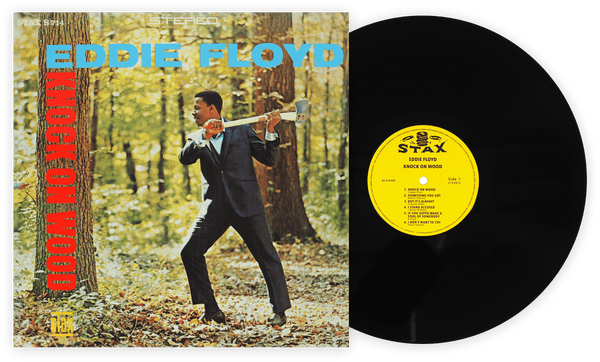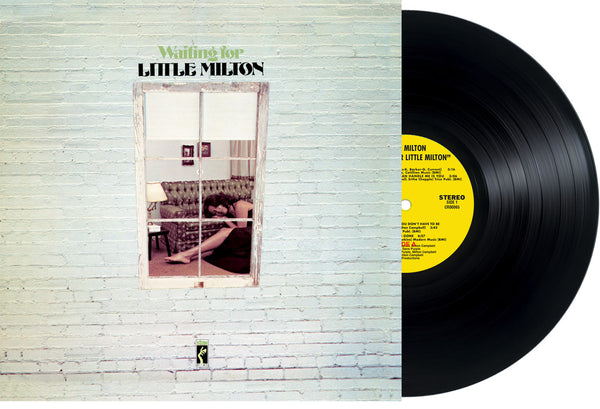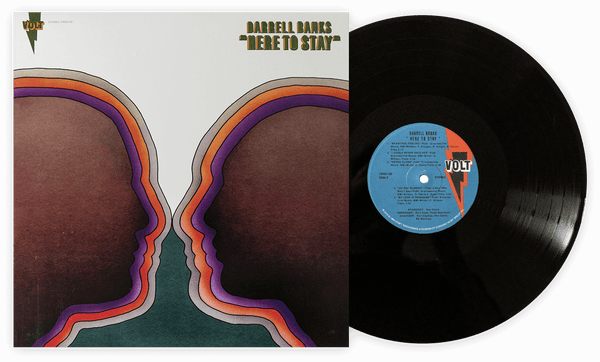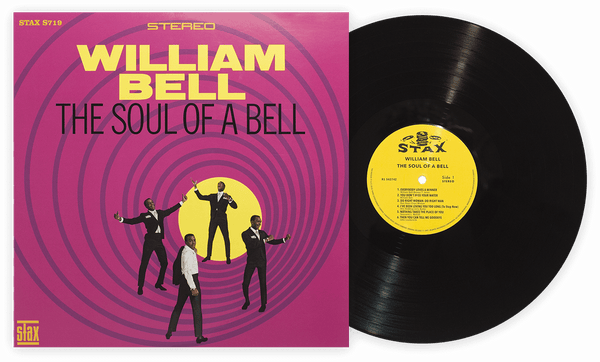I 10 migliori album Stax da possedere in vinile
Se non lo hai sentito, la selezione per l'abbonamento Classics di ottobre è Comfort Me di Carla Thomas, il secondo album della cantante, registrato quando è tornata alla Stax dopo aver preso del tempo per andare all'università dopo che i suoi primi singoli avevano reso possibile il successo dell'etichetta (“Gee Whiz” ti ha dato Otis Redding).
Comfort Me is just one of three Stax albums we have on the docket for our Classics subscription--we featured Ollie & The Nightingales and will feature Little Milton’s Waiting For Little Milton in a couple months.
But now that you have two Stax albums thanks to Classics, you’re probably wondering where to go from here. Stax is one of the most important independent American record labels maybe in recorded music history, launching the careers of Otis Redding, Isaac Hayes, Booker T. Jones, William Bell, Mavis Staples, Albert King and many, many more. Memphis is a literal crossroads for highways and rivers of the south, and Stax turned it into a musical crossroads for black music--soul, blues, and R&B-- in the 1960’s and ‘70s. So if you’re looking to continue your studies of the Stax canon, start with these 10 albums.

Carla Thomas: B-A-B-Y
You’re already getting Comfort Me so why not get this Carla Thomas album too; reissued this year by Stax, with fortuitous timing thanks to the song’s prominent place on the Baby Driver soundtrack. B-A-B-Y is must own for reasons beyond that though; this album was a showcase for the David Porter-Isaac Hayes writing team, as around the release of B-A-B-Y they suddenly became the best writers of soul music on the planet for a bit (they also wrote most of the Sam & Dave canon). But ultimately, this album is must own for the opportunity to support the legacy of Carla Thomas, which, given the totemic stardom of some of her male labelmates is often shoved off to the side (even in this write-up! I’m part of the problem).

Booker T & The M.G.’s: McElmore Avenue
Booker T & The M.G.’s were Stax’s house band and Booker T. Jones was the Stax house producer for a giant bulk of the label’s 15 years, playing on many of the label’s biggest hits and albums. They were also the first act to put out a full length LP on Stax; their 1962 album Green Onions was the label’s first LP megahit, hitting number 33 on the pop charts, which is remarkable for an instrumental album in any era. But that’s not the album I’m recommending here: McElmore Avenue might bear the distinction for the weirdest album in the Stax catalog, as it’s a largely instrumental cover of the Beatles’ Abbey Road, released just over six months after that album came out. It has virtually no reason to exist--why would the Stax instrumental band be covering the Beatles?--but that’s why it’s so fun; the jam out on “Come Together” is as good a distillation of everything the M.G.’s did in one song.

Albert King: Born Under A Bad Sign
Stax doesn’t get much due for the amount of blues it put out, because the soul releases are what kept the light on. But the label released an album from John Lee Hooker, multiple albums from Little Milton, and most notably, their biggest blues artist, Albert King, who released eight albums on the label. That includes one of the best blues albums of all time: Born Under A Bad Sign, a ripping, best of both worlds album, that features the M.G.’s as the house band for King’s blues guitar pyrotechnics. The title track is one of the best blues singles of all time, and somehow the rest of the album manages to live up to it.

Otis Redding: The Soul Album
Otis Blue gets the cratedigger love, Sittin’ On The Dock Of The Bay gets the love for being the biggest hit, and Dictionary of Soul gets the “that one is underrated” love, but for my money, this is a crown jewel that never gets mentioned as essential in the Otis canon. It’s got Otis covering Sam Cooke--his hero--in service of moving past his influence, his amazing take of “Treat Her Right,” and the eventual classic “634-5789.” But it also boasts the most emotional, open performances of Otis’ entire career with “Cigarettes And Coffee.” Otis is often reduced to a myth, but The Soul Album is him as a raw performer, just a soul singer bleeding his heart out over every track.

William Bell: Bound to Happen
Stax’s roster is filled out by a bunch of performers who never got their just due, but that’s the nature of the beast. William Bell is one of those, and part of that is just the bad luck of his life: He was poised to be one of Stax’s solo stars, releasing a single as far back as 1961, before being drafted to serve in the military during Vietnam delayed his attempt at being a popular artist in the Stax lineup. He issued his first album, The Soul Of A Bell, in 1967, and got lost in the shuffle behind Sam and Dave, Isaac Hayes, and others. He got to make solo albums, but most of his success was in writing for other performers. He has a couple amazing classics in his catalog though--Phases Of Reality is a soul concept album--the chief being Bound to Happen, which boasts the original version of “Born Under A Bad Sign”--written by Bell--a cover of “Everyday People” and the ode to heartbreak “A Smile Can’t Hide (A Broken Heart).” But the showstopper is the opening track, “I Forgot To Be Your Lover,” arguably the most underrated song in the entire Stax canon. Bell won a Grammy this year for a comeback album; revere our legends while they’re still here.

Johnnie Taylor: Wanted: One Soul Singer
Johnnie Taylor was probably a bigger star post-Stax than he was while on the label--his “Disco Lady” was a number one hit for Columbia--but he was one of the label’s stalwarts; a consistent R&B hitmaker for the label for the better part of 10 years. His debut LP on Stax, Wanted: One Soul Singer, was a roadmap for what would become his bread and butter; the slow jam, slow burn ballad, where he could vamp, and howl, and croon. You can practically hear the sweat drip off of him as this album rolls on.

Isaac Hayes: Black Moses
It’s worth remembering that Stax’s braintrust didn’t want to let Isaac Hayes be a solo performer; they liked him ensconced in the Stax studio, writing hits for everyone else. They acquiesced, and he propelled the label to big sales in the post-Otis Redding days where it seemed like the label might be in serious trouble. Shaft and Hot Buttered Soul are the Isaac albums everyone points you to, but Black Moses is the peak of Isaac’s wide-eyed artistry, an audacious double album featuring Jackson 5, Dionne Warwick, and Curtis Mayfield covers, and multiple smooth-talk sketches where Isaac just talks his slick talk over some organ. It’s more unwieldy and shaggy than Stax albums were often given the opportunity to be. It’s worth tracking down a complete original, since it comes packaged with a huge poster of Isaac as Moses.

Mavis Staples: Mavis Staples
Before her solo career got relaunched this century by Jeff Tweedy, Mavis Staples and her family the Staple Singers were a linchpin of the Stax roster in the mid-’60s thru the label’s demise. But even back then, people recognized Mavis could be a solo star, so Stax subsidiary Volt had her record two albums in 1969 and 1970, respectively. Her self-titled debut shows how complete of a performer she was basically from the start; her tear down the walls versions of “Son of a Preacher Man,” “You Send Me” and “Sweet Things You Do” are absolutely essential. But the centerpiece of this album is “A House Is Not A Home,” which features a ruminative saxophone solo, and an astonishing vocal performance from Mavis.
You can get the Vinyl Me, Please edition of this album right here.

Eddie Floyd: Knock on Wood
Like William Bell, Eddie Floyd’s greatest success at Stax was through his songwriting for basically every other artist on the label--he got into the Stax fold via writing for Carla Thomas on Comfort Me--but unlike Bell, Floyd had a genuine hit with the title track to his debut LP, Knock On Wood. The rest of the album plays up to the loose and jocular tone set by the title track, culminating in the amazing deepcut “High-Heel Sneakers.”
This album is the Vinyl Me, Please Classics album for November 2018. You can sign up to receive it here.

David Porter: Victim of the Joke? An Opera
David Porter was the unheralded part of the Hayes-Porter songwriting duo, particularly after Isaac become a mega solo star, completing the Death Star overshadow of Porter. But Porter’s four LPs for Stax subsidiary Enterprise are all lost classics, worthy of the devotion that has greeted Isaac’s solo material at the very least. His masterpiece is this album, a concept album tracking a relationship between a man and a woman--who’s dating someone else--before she runs off to Philly leaving the man heartbroken. There are digressions along the way--there is probably no album ever with this many interludes--but it’s an audacious undertaking that Porter manages to pull off. It’s a hard one to come by in the wild, and Discogs prices on the original version hover around $40--definitely one of the most expensive in the Stax catalog--but if you find it, buy it, and never look back.
Andrew Winistorfer is Senior Director of Music and Editorial at Vinyl Me, Please, and a writer and editor of their books, 100 Albums You Need in Your Collection and The Best Record Stores in the United States. He’s written Listening Notes for more than 30 VMP releases, co-produced multiple VMP Anthologies, and executive produced the VMP Anthologies The Story of Vanguard, The Story of Willie Nelson, Miles Davis: The Electric Years and The Story of Waylon Jennings. He lives in Saint Paul, Minnesota.
Related Articles
Unisciti al Club!
Iscriviti ora, a partire da 44 $Esclusivo sconto del 15% per insegnanti, studenti, membri militari, professionisti della salute & primi soccorritori - Verifica la tua identità!








